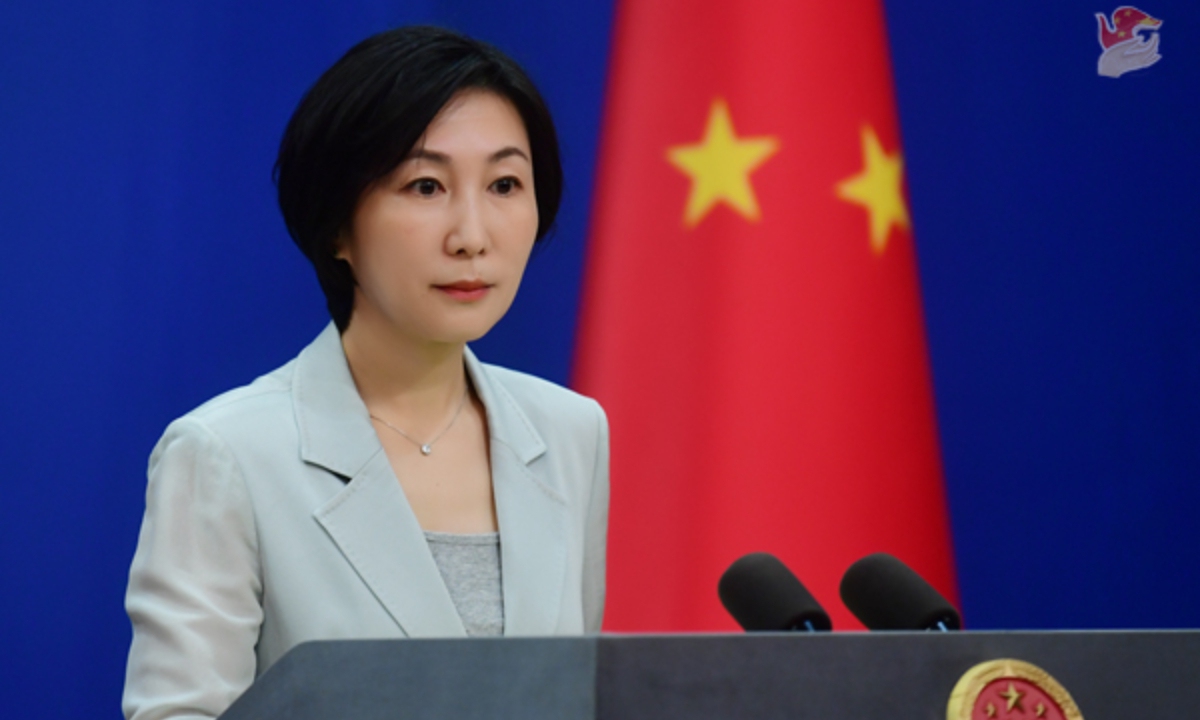
Foreign Ministry Spokesperson Mao Ning Photo: Ministry of Foreign Affairs
China's economy has not collapsed, but on the contrary, hype that it has done so has repeatedly proven to be false, said Chinese Foreign Ministry Spokesperson Mao Ning on Tuesday, defying Western smears that China's economy is facing difficulties and slowing down.
"All sorts of comments predicting the collapse of China's economy keep resurfacing every now and then. But China's economy has outlived them all. What has collapsed is such rhetoric, not China's economy," Mao said at a regular press conference on Tuesday.
She made the remarks in response to a question for comments regarding that some Western politicians including US President Biden claimed China's growth was slowing due to a weak global economy as well as Chinese policies.
Some Western officials and media outlets have unleashed a tsunami of misinformation in recent months in a concerted smear campaign to paint the Chinese economy as being at the cusp of "collapsing." Even Biden has joined the campaign, first describing the Chinese economy as a "time bomb," albeit getting the numbers wrong and most recently calling China's economic situation a "crisis."
A recent article from
US news magazine Newsweek, entitled "Has China's Shanghai Turned Into 'Ghost Town'? What Photos Show" citing a user of social media platform X and photos he posted which suggested China's Shanghai has turned into a "ghost town," has stirred strong sentiments on Chinese social media. Many expressed shock at the absurdity of the photos cited in the article trying to paint one of the world's biggest cities with a population of about 25 million people as a "ghost town."
Mao said that despite the sluggish economic recovery globally, the Chinese economy has continued to recover and improve, and it has remained a major driving force for global economic growth.
China's first-half GDP grew by 5.5 percent year-on-year, significantly faster than the 3 percent growth last year. The IMF predicts that China's economy will grow by 5.2 percent this year and contribute one-third to global economic growth.
"I want to emphasize that the Chinese economy has strong resilience, great potential and vitality, and its long-term fundamentals remain unchanged. We have the confidence and ability to promote sustained and healthy economic development," Mao said.
Recent economic data have offered a different picture from what Western officials and media outlets have claimed.
New bank loans in China almost quadrupled in August from July to an all-time record of 1.36 trillion yuan ($186.18 billion), the central bank announced on Monday. The figure was far above expectations and showed that the intensive series of macro policies announced in August had an almost immediate effect in boosting market confidence.
The CPI, a main gauge of inflation, returned to growth from a decline in August while the PPI, which measures costs for goods at the factory gate, narrowed its decrease compared with July, indicating a stabilization and recovery in the overall price level in China, which defies the foreign media hype about China's deflation pressures.
China's total trade also beat expectations to sustain an upward trajectory in August, as the country's foreign trade structure continued to improve with a competitive edge, while a host of targeted measures to bolster the economy showed results.
Personal consumption also showed strong signs of recovery. During the summer travel peak between June and August, the number of domestic trips totaled 1.839 billion, generating revenue of 1.21 trillion yuan, according to industry data. Many areas of consumption saw strong growth or even record high numbers during the period. Total box office takings reached a new high of 20.6 billion yuan.
China remains committed to high-level opening-up, strengthening cooperation with countries around the world, and sharing the dividends of development. China's development will bring more opportunities for neighboring countries in Asia and the world, Mao said.




